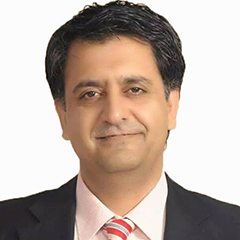
Growing up in the Jihadist Pakistan of the late 1980s and 1990s had certain advantages that ignorance bestowed upon its adherents. Youth — myself included — carried a very simple worldview that had a promise of an ultimate victory for (Pakistani) Muslims, and a crushing defeat for the non-Muslim world. A large chunk of my generation, and that too coming from lower middle and poor social economic strata, felt extremely charged and motivated to go out, wage Jihad, kill and be killed. Aggression and death were romanticised by whatever form of the publicity was available those days with PTV in the lead.
I clearly recall that Jamaat-e-Islami and other Jihadist organisations would bring Mujahideen from Afghanistan to my little hometown, Malakwal, to motivate the local youth, and probably also as part of a larger narrative building in favor of the State that fought in Afghanistan. Once the Afghan Jihad was ending, the Kashmir Jihad started, and the Jihad Incorporated started bringing to Malakwal Kashmiri Mujahideen. These Mujahideen would address throngs of locals at the erstwhile Railway Chowk, later renamed as Milad Chowk when Gen Zia started his synthetic Islamisation.
I also remember writing to Jamaat-e-Islami in early 1990s along with my paternal cousin Danial to recruit us and take us to Bosnia. We, as youth, wanted to die in glory of the battle, and what better way could be to heavens than dying in the name of Allah in a foreign battlefield where Muslims were persecuted, brutalised and killed? I and Danial were not alone who fell victim to an extremely unhealthy national narrative of militancy that eventually drove Pakistan to where it is now.
A relief that neither I nor Danial went to fight anywhere and survived to live our lives today — but many did. Some returned, some didn’t. The ones who didn’t would have their names written on shabby metallic boards alongside the potholed roads, mostly in the countryside of Punjab where their mothers mourned, fathers wept silently, sisters longed for brothers, and wives stared with empty eyes unsure of their future. As it all happened to poor and lower middle-class families in Pakistan, the official and religious leaders of the Jihad Incorporated had their sons becoming bankers, doctors, actuarialsts, industrialists, stock brokers, and computer engineers. These sons and daughters of the official and religious leaders greatly benefitted from the economy of a falsified Jihad. Ironically, they now make quite a fair part of the ruling elite and lecture lesser human beings about Pakistan.
One among the Kashmiri Mujahideen was ‘Major’ Must Gul who reportedly burnt down the Ziarat of Charar Sharif during one of his gun battles in Indian-held Kashmir. He later busied himself selling small quantities of heroin and other drugs, and was arrested a few times too. Another hero of the day was one Ilyas Kashmiri, a former elite soldier and eventually a dangerous Al-Qaeda operator that turned against the State and the very people whom he once vowed to defend and die for. His ‘Jihad’ would have continued hadn’t a drone strike done Pakistan and its people a favour.
I clearly recall that Jamaat-e-Islami and other Jihadist organisations would bring Mujahideen from Afghanistan to my little hometown, Malakwal, to motivate the local youth, and probably also as part of a larger narrative building in favour of the State that fought in Afghanistan
A famous late religious cleric in Rawalpindi once was really close to then Chief Minister of Punjab, Mian Nawaz Sharif. His huge madrasa in downtown Rawalpindi was where the Mujahideen would stay going to and coming from Afghanistan. He also served as the Punjab provincial minister for Zakat and Ush’r. The same ‘famous cleric’ finally found his soulmate in Molana Abdul Aziz of Lal Masjid and was seen with him numerously. His son-in-law ran a small chain of eight ice cream parlours in a huge Western metropolis. While sons of ordinary Pakistanis killed and died on his motivation.
Another chief of a Jihadist party had his brother’s family in a Western country who fought against the deportation to Pakistan for over five years. The brother, an engineer, tried to manipulate the system of immigration, and never wanted to come back to Pakistan, the very country that his family turned into an intolerant society.
With families destroyed and children lost, two generations of Pakistani youth were wasted. Society became intolerant when people became violent and conveniently used religion to equalise petty disputes. A pedestal of civilisations, Pakistan, degenerated in the acid of obscurantism and our State happily plodded the quagmire that dragged it down.
We have drifted a long way from the centrality of our natural course. The damages that the Jihad Incorporated has inflicted on our nation would take a long time to be undone. Yet we, the ordinary citizens of Pakistan, still fear if their steely will to run the full course is present or not. Hapless in the face of their goals.
The writer is a social entrepreneur and a student of Pakistan’s social and political challenges. He tweets at @mkw72
Published in Daily Times, October 3rd 2017.
